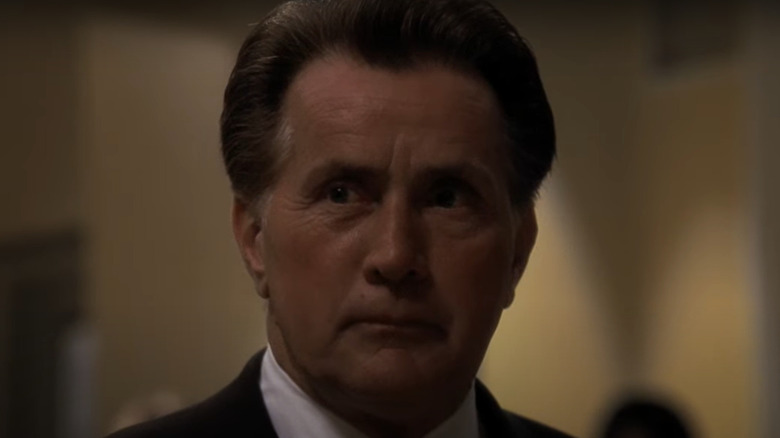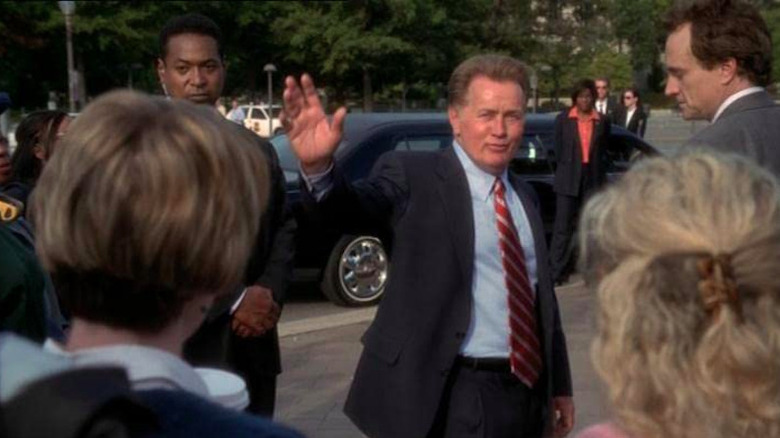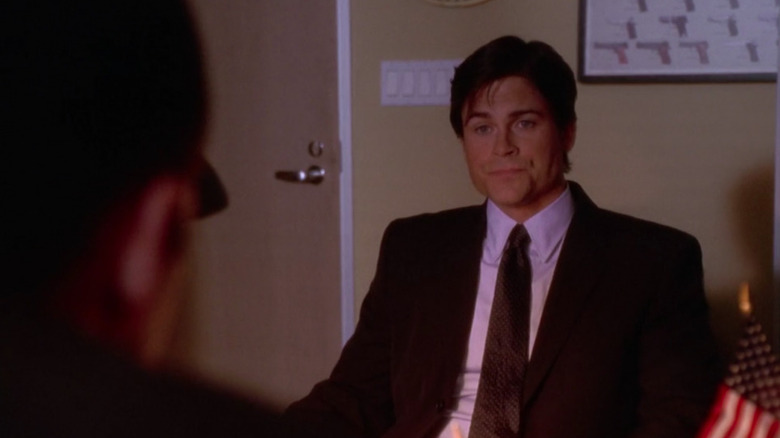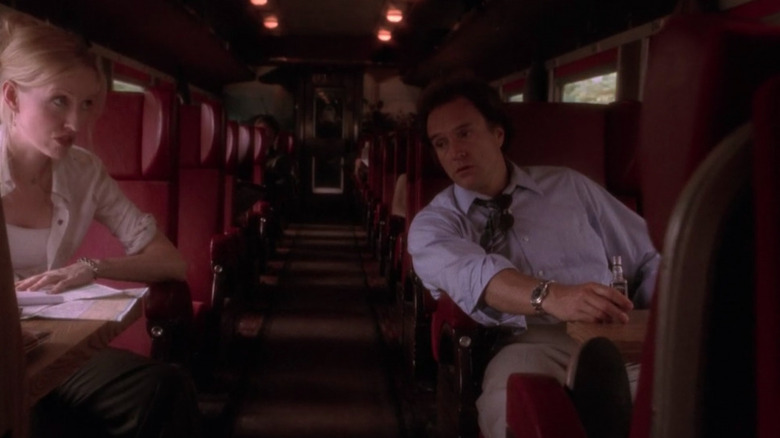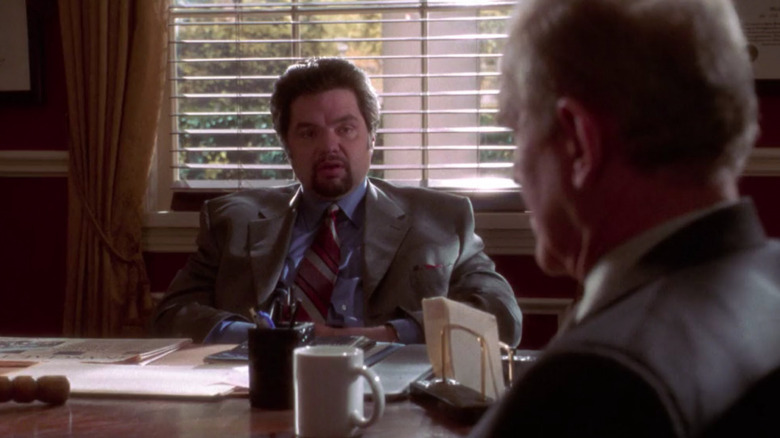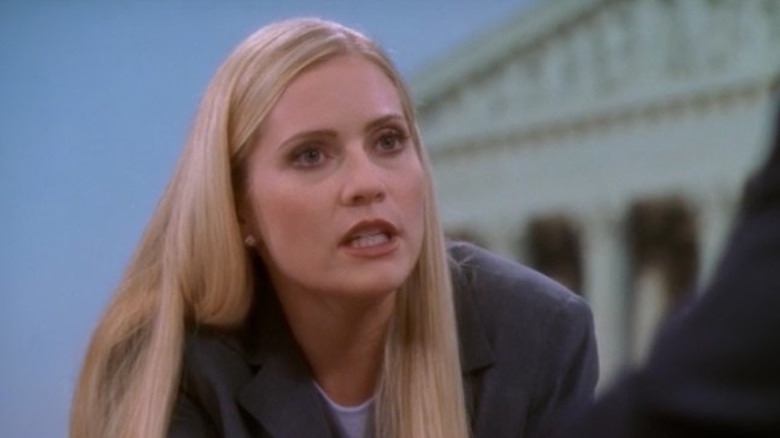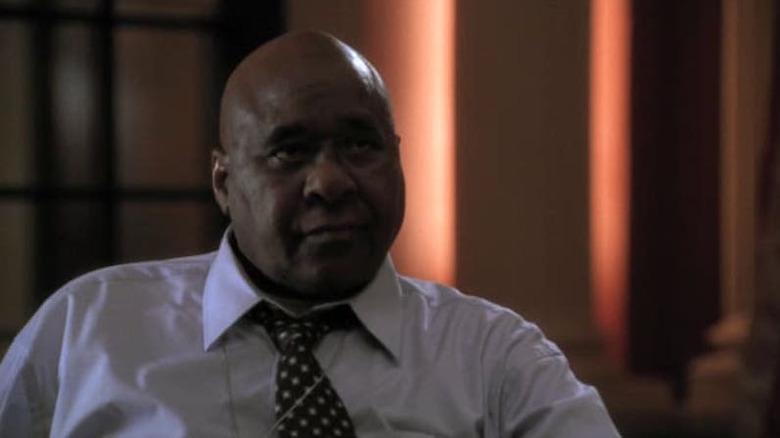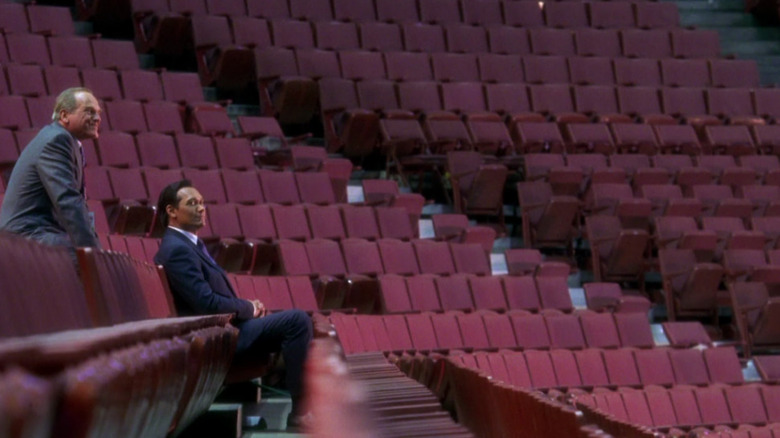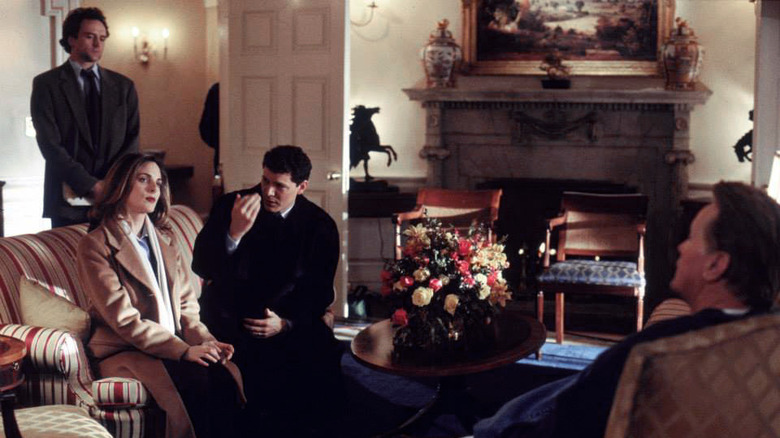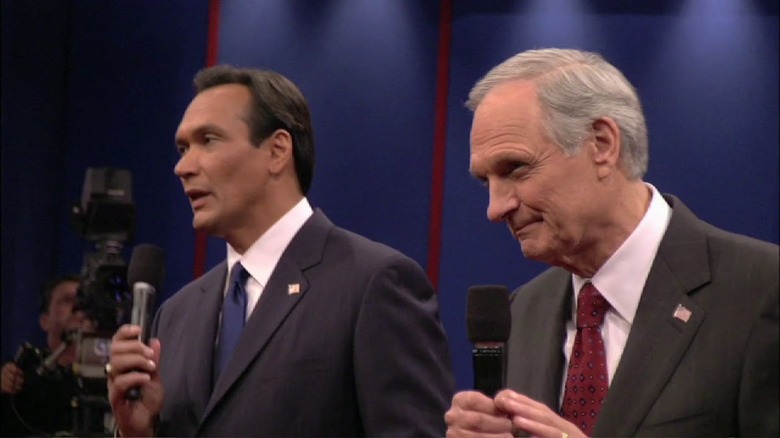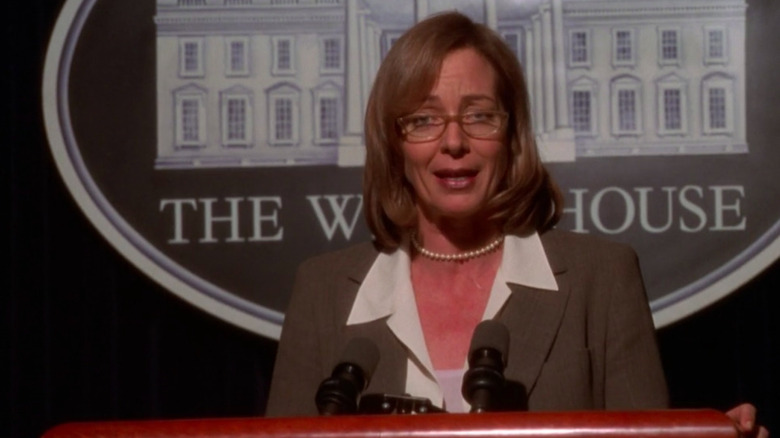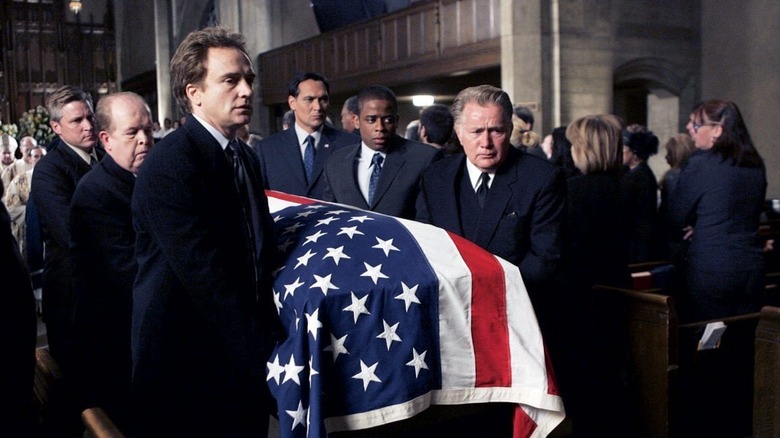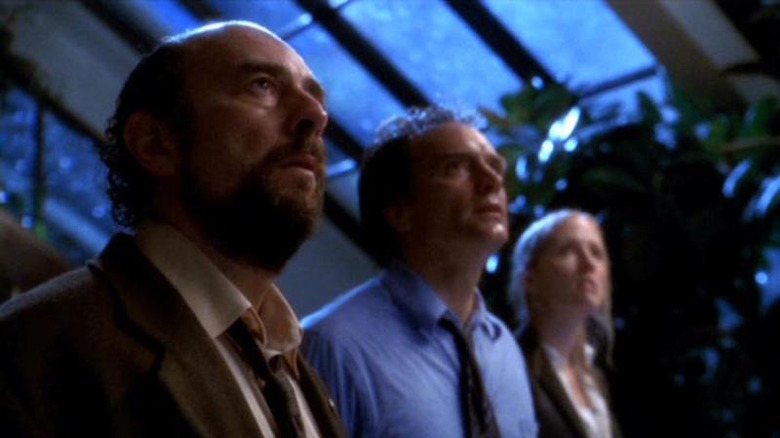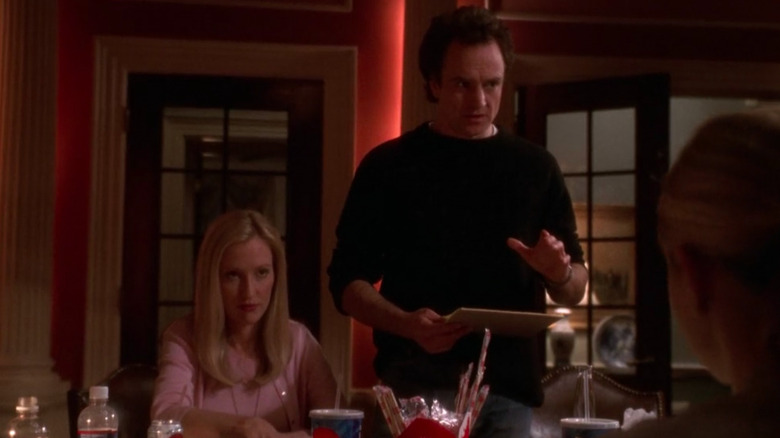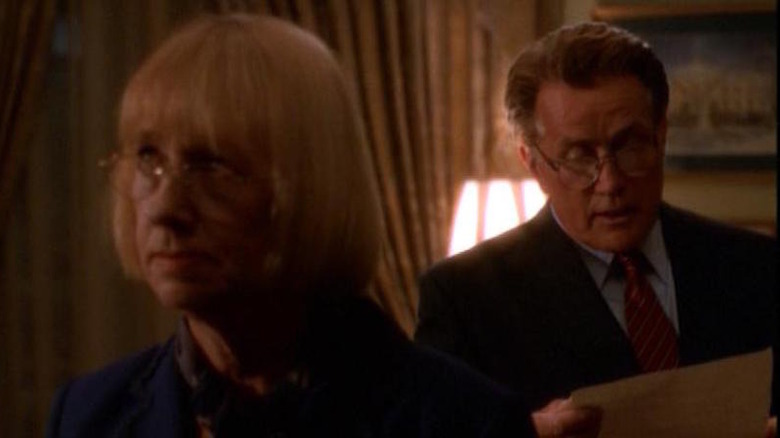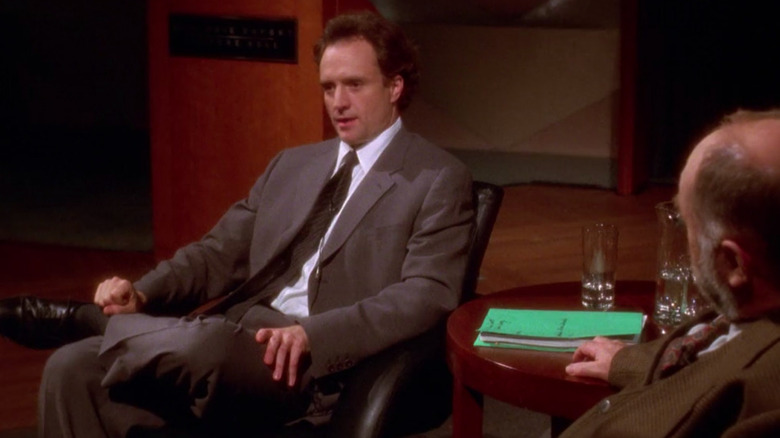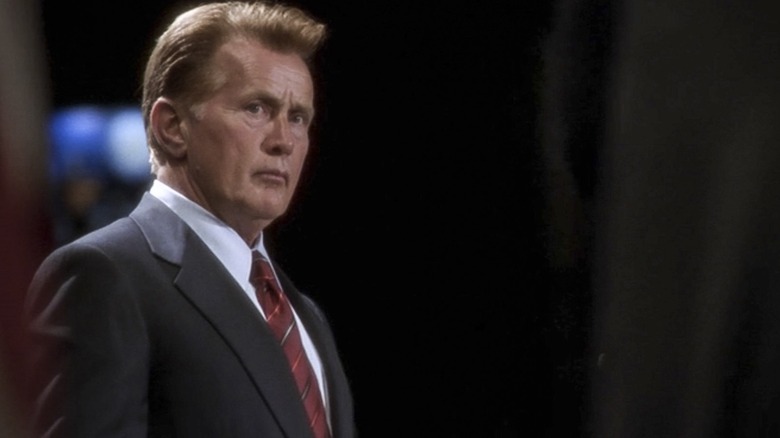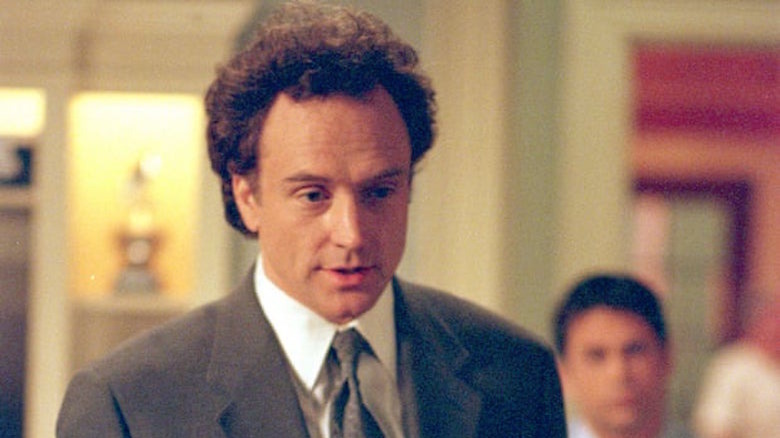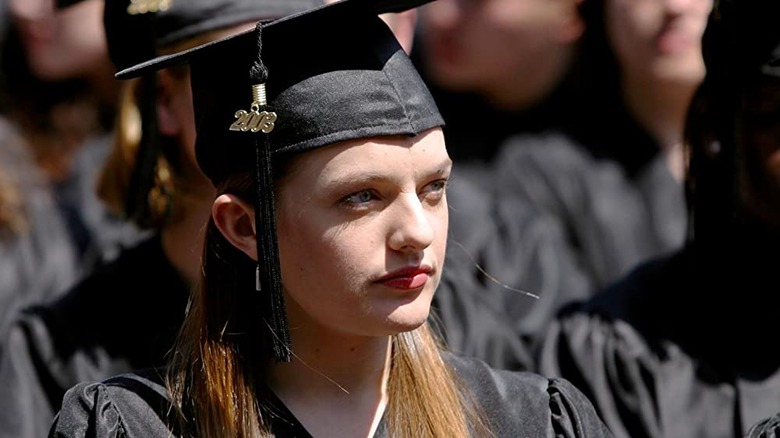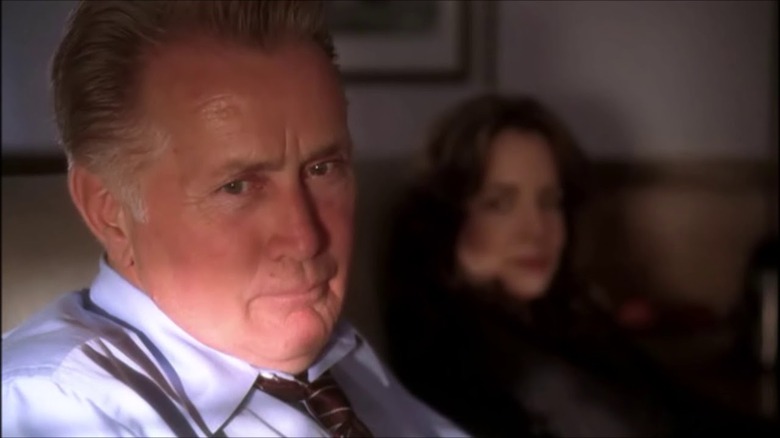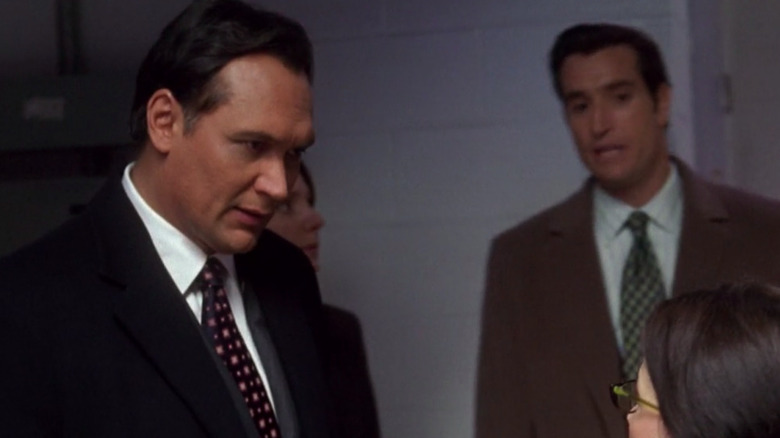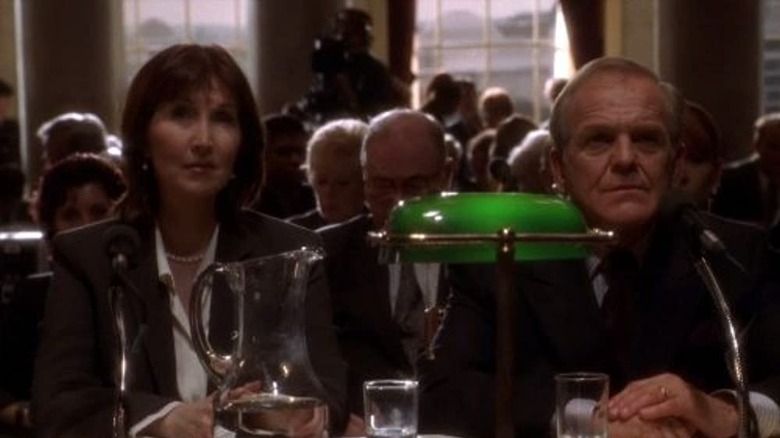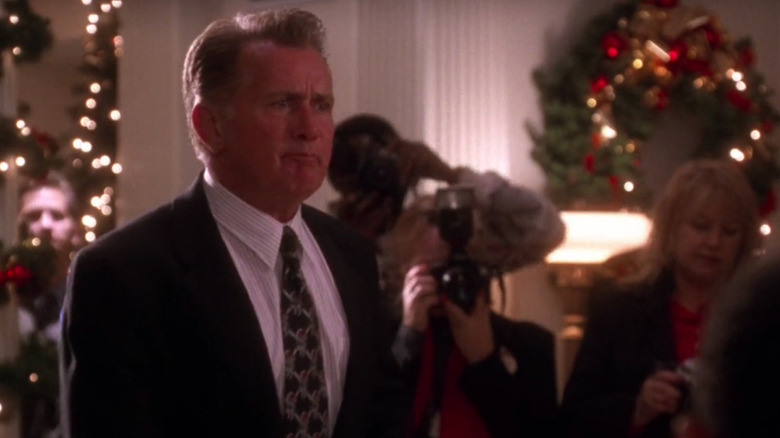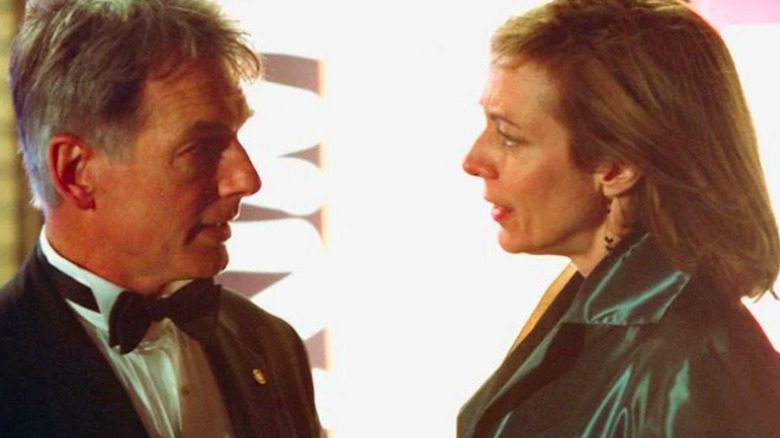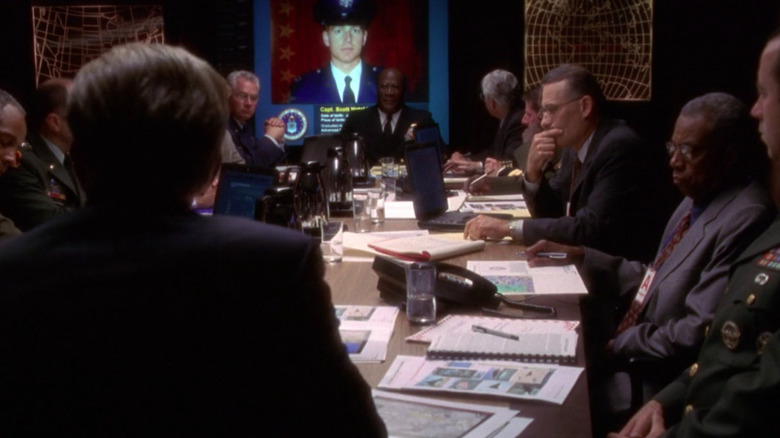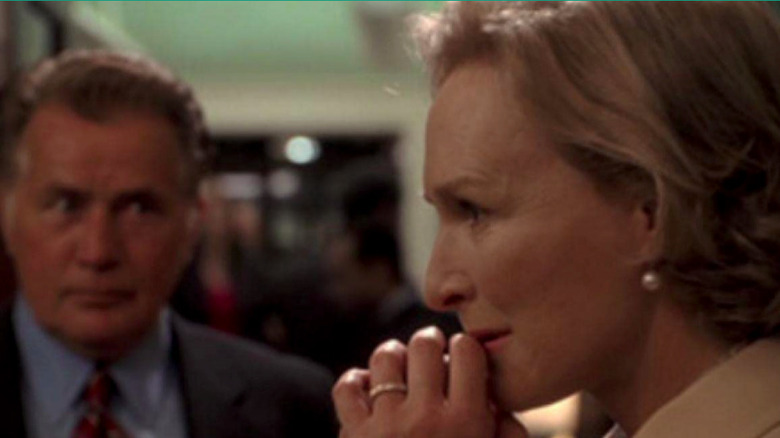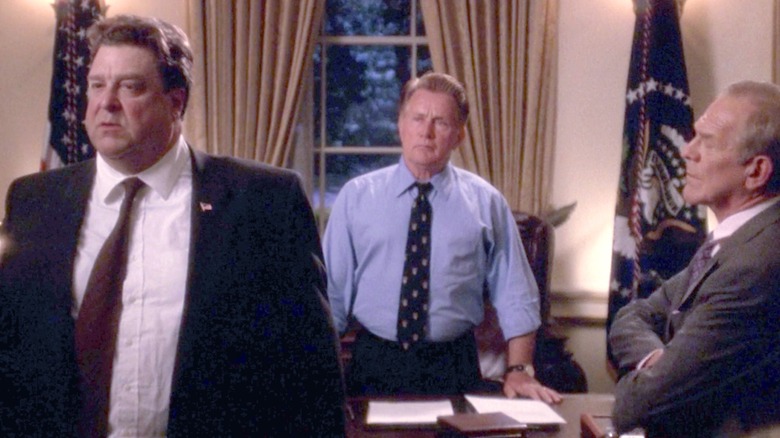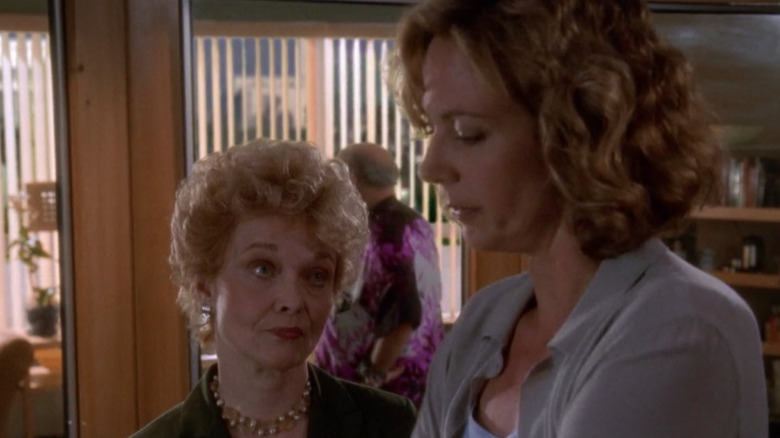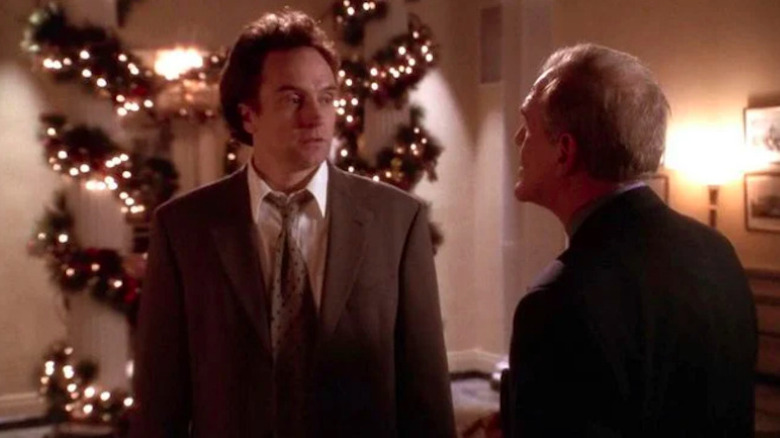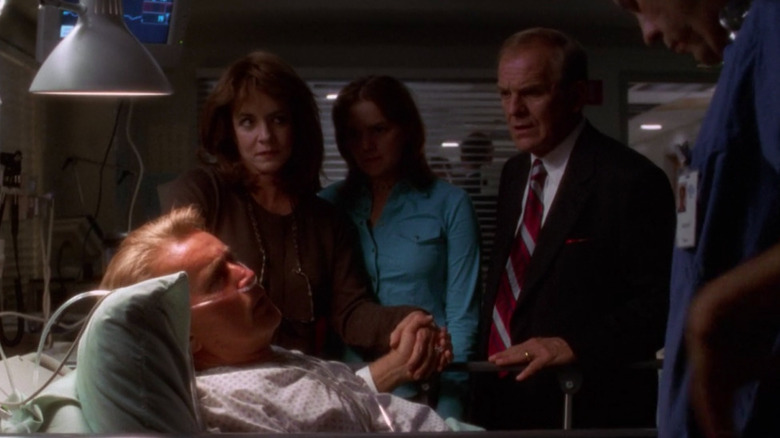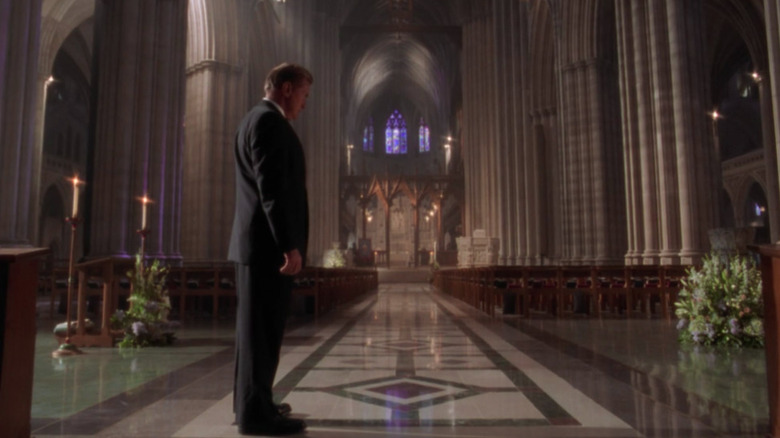30 Best West Wing Episodes Ranked
There are some shows that just stick with you. "The West Wing," which concluded its seventh and final season over 15 years ago, is one of those shows. One of the most beloved network programs of all time, "The West Wing" features so many iconic moments that it's hard to know where to start. Remember when Bartlet yelled at God in Latin in an empty cathedral? Or when he took down a homophobic radio host by quoting the bible at her? Remember when C.J.'s office was filled with turkeys? Or when Donna made Josh change into a pair of waders because he hadn't showered in days?
If we really took the time to sit here and write down every great moment on "The West Wing," this article would be the length of a novel. Since we're not in the business of book-writing, we've decided to truncate this list into something a bit more easily digestible. Though "The West Wing" is full of great moments and rousing speeches that can stand on their own, we're going to focus on individual episodes based on the highest ratings according to IMDb. So, without further ado, here are the 30 best "The West Wing" episodes.
30. Shutdown (Season 5, Episode 8)
Even though "The West Wing" is primarily associated with its creator, Aaron Sorkin, he actually left the show after Season 4. Unsurprisingly, the show changed somewhat after he left, and it began to feel a bit more like a procedural from then on. (Albeit, an incredibly well-written, fast-paced procedural.) Nonetheless, there are still some pretty solid episodes in the last three seasons of the show, including "Shutdown."
Based on an actual government shutdown that occurred in 1995, "Shutdown" depicts a stalemate between President Bartlet and the Republican Speaker of the House. One of the things that's so incredible about "The West Wing" is its ability to make even the dullest-sounding situations thrilling. A bipartisan debate about the budget seems like the least interesting governmental process we could think of, but here it's totally exciting — and also educational. Plus, it's an important moment for the Bartlet administration, who finally come out on top.
29. Somebody's Going to Emergency, Somebody's Going to Jail (Season 2, Episode 16)
Prior to leaving the show in Season 4 due to a supposed pay dispute, Rob Lowe played Sam Seaborn, one of the central characters on "The West Wing." One episode in Season 2 is especially Sam-centric, and unsurprisingly, it's one of Lowe's favorite episodes of the show. "Somebody's Going to Emergency, Somebody's Going to Jail" follows Sam as he tries to get a pardon for his friend's grandfather, who was accused of being a communist spy decades earlier. In order to achieve this goal, Sam must face down some pretty powerful people, including but not limited to the NSA Director Nancy McNally (Anna Deavere Smith).
Speaking with Empire, Lowe notes that this is one of his favorites not only because he got nominated for an Emmy for this episode, but also because of the structure of the episode itself. As Lowe puts it, it's a "free-standing episode that was hermetically sealed in terms of its narrative," a type of episode that for him was "the highlight of doing the show."
28. 20 Hours in America: Part I (Season 4, Episode 1)
There are a few two-part episodes in "The West Wing," and they're all pretty excellent: One such episode takes place at the beginning of Season 4. "20 Hours in America: Part I" sees Toby, Josh, and Donna in Indiana after Bartlet has given a speech there. It's an amusing fish-out-of-water situation where the locals think the White House staffers are elitists (which they are), and the staffers think the Indiana residents are simple rednecks.
For Richard Schiff, who plays Toby in the show, it was one of his favorite episodes to shoot. They spent a week in Pennsylvania — not Indiana, as it turns out — filming it, and it also features a guest appearance from the one and only Amy Adams. The episode is a perfect balance of levity and gravitas, as Bartlet returns home to the news of a terrorist attack and an assassination while his staffers are still struggling to find a way back to Washington.
27. Bad Moon Rising (Season 2, Episode 9)
Midway through the second season of "The West Wing," "Bad Moon Rising" depicts a typically busy day in the White House. Bartlet speaks with the White House Counsel (played by Oliver Platt) about the potential fallout that might come from the concealment of his pre-election diagnosis of MS. Toby and C.J. discover that there is a leak within the White House and interview the staffers to find out who it is. Meanwhile, Josh and Donna argue about (what else?) the collapse of the Mexican economy.
Like most episodes of "The West Wing" — apart from the rare bottle episode — "Bad Moon Rising" is customarily fast-paced (both literally and figuratively: "West Wing" characters tend to walk and talk at extreme speeds). It's probably not many people's number one favorite episode, but even when "The West Wing" is just competent, it's still very good, all things considered.
26. In This White House (Season 2, Episode 4)
"In This White House" features the first appearance of beloved "West Wing" character Ainsley Hayes, played by Emily Procter of "CSI: Miami" fame. In her memorable first scene, she's featured on a TV show where she debates Sam about the merits of the Republican education bill versus the Democrat plan — and totally annihilates him. Josh is watching, of course, and runs into Toby's office saying "Toby, come quick. Sam's getting his ass kicked by a girl." Against his staff's wishes, Bartlet actually hires Hayes to work for his administration.
Also in this episode, Josh and Toby have to lead a conference between several American pharmaceutical companies and the President of Equatorial Kundu, whose country is in the midst of an AIDS crisis. Overall, Season 2 features some of the best that "The West Wing" has to offer, and "In This White House" is a great example of why. Plus, the addition of Ainsley Hayes this season improves its quality immeasurably.
25. Mr. Willis of Ohio (Season 1, Episode 6)
"Mr. Willis of Ohio" is one of those rare "West Wing" episodes that takes a look at how those outside the White House are affected by governmental policy. Much of this episode focuses on the census, as Toby and Mandy (Moira Kelly) meet with several congressmen to discuss proposed changes. Two of the representatives — lifelong politicians — refused to be swayed, but one, Mr. Willis of Ohio (temporarily filling the position of his late wife), actually listens to Toby and Mandy's argument.
Elsewhere, C.J. must swallow her pride and admit to Sam that she doesn't understand the finer points of the census, giving the show the perfect opportunity to explain it to the audience. It's a solid episode, and its decision to focus on a school teacher — the titular Mr. Willis — is a welcome reminder that not everyone is as wrapped up in the goings-on of the White House as our main characters are.
24. 2162 Votes (Season 6, Episode 22)
The only episode on this list from Season 6 is the finale, entitled "2162 votes." It focuses on the Democratic National Convention, with three candidates still vying for the nomination. As we now know, it's Matt Santos (Jimmy Smits) who eventually wins out. The episode takes place over three days at the convention, with Leo becoming increasingly worried that a nominee will not be chosen, which would create a narrative of discord within the party.
Meanwhile, there has been a security leak concerning a secret military shuttle, and the F.B.I. are scrambling to find its source. Bartlet must decide whether to send the secret military shuttle to rescue astronauts trapped at the space station: He risks national security if he does, but if he doesn't, they will likely die. It's a tightly constructed piece of television, with the time constraints placed on all the characters making it a tense 45 minutes of decision-making and countdowns.
23. Take This Sabbath Day (Season 1, Episode 14)
"Take This Sabbath Day" is an important episode of "The West Wing" because it's the one where we first get to meet pollster Joey Lucas, played by the brilliant Marlee Matlin. The moment where Josh first crosses paths with Joey is a funny one, and it's one of Bradley Whitford's favorites. He's not slept or left the office in some time, and he's wearing a pair of yellow waders Donna has made him put on. When Joey barges in full of righteous indignation, Josh has no idea what's going on.
Much of the episode focuses on the moral question of the death penalty. Bartlet has 48 hours to decide whether or not to commute the sentence of a man on death row. Unsure of what decision to make, he seeks the counsel of his childhood priest (Karl Malden). Meanwhile, Toby feels conflicted about the issue when his rabbi (David Proval) gives a sermon on capital punishment. Yet another "West Wing" episode where timing is everything and decisions are made right down to the wire, this episode's focus on morality is incredibly compelling. Moreover, the addition of the unstoppable Joey Lucas adds fire and humor to what is otherwise an intensely serious episode.
22. The Debate (Season 7, Episode 7)
Though Season 7 of "The West Wing" is rarely considered the best of the series, it does have a number of spellbinding moments. One of its finest occurs in "The Debate." In an incredibly novel move, the entire episode features a debate between Santos and Vinick (Alan Alda), and it was all done live. They shot two live broadcasts, one for the East Coast, and one for the West Coast, and the episode was a mix of scripted dialogue and some improvisation on the part of Smits and Alda. It was a huge ratings success for the season — viewership nearly reached 10 million – and it's only right that such a unique episode be included on the list.
"The West Wing" has always been a show that grapples with time (or the lack thereof) in a very visible way, so it's fitting that this episode takes a stab at actually depicting White House time as-is. Though viewers couldn't literally cast their votes following the debate, the live nature of the episode does make it feel like it's up to the audience to decide who won. "The Debate" proves that even a Sorkin-less season of "The West Wing" can still reach for the stars.
21. The Stackhouse Filibuster (Season 2, Episode 7)
Season 2, Episode 7 of "The West Wing," entitled "The Stackhouse Filibuster," is kind of a silly episode. But so is the idea of a filibuster, so it makes sense, really. The episode begins with the White House staff impatiently waiting for an elderly senator (George Coe) to yield the floor. The senator is staging a filibuster in order to delay the vote on Bartlet's Family Wellness Act.
Meanwhile, C.J. is desperately trying to find a ceramic statue given to Bartlet by a Middle Eastern monarch who expects to see it displayed during his visit, while Josh struggles to finish his work so that he can visit the New York Mets training camp in Florida. While this episode very well could have been pure filler — much like the function of a filibuster itself — instead it's an amusing journey through the sometimes absurd world of the White House. Alison Janney — undoubtedly the funniest person in the cast — always knocks it out of the park with the more outlandish C.J. scenes, and this episode is no exception.
20. Requiem (Season 7, Episode 18)
Late in the seventh season, "Requiem" primarily focuses on Leo McGarry's funeral. This episode sees many former Bartlet staffers and friends return to say goodbye, including Ainsley Hayes, Joey Lucas, and Mary-Louise Parker's Amy Gardner. This is also one of the few episodes that features all three of the President's daughters, played by Elisabeth Moss, Annabeth Gish, and Nina Siemaszko.
"Requiem" is made all the more heartbreaking by the fact that John Spencer, who played Leo, died in real life. A year after Leo had a nearly fatal heart attack on the show, Spencer himself died of a heart attack at age 58. Since he passed away during a hiatus while they were filming the show's seventh season, his death was then written into "The West Wing."
In the original season finale, Vinick was meant to be elected President, but, according to Martin Sheen, the writers decided the show couldn't handle the double blow of Leo dying and Santos losing. All in all, the episode is a powerful send-off to a beloved character and actor.
19. 20 Hours in America: Part II (Season 4, Episode 2)
In the second installment of the two-part Season 4 opener, Toby, Josh, and Donna are still trapped in Indiana and trying to make their way back to D.C. In the meantime, Bartlet is met with a host of problems when he returns to the White House. There has been a domestic terrorist attack resulting in the deaths of several college students, and the President has been accused of being involved in the assassination of a foreign leader. While the sequences in Indiana are full of humor and hijinks, the mood at the West Wing is much more somber.
The second part of the season opener also features two different Bartlet speeches, both of which are incredibly moving. It's a reminder that along with being masterful at mapping out plots and characters, Sorkin is, at his heart, a wordsmith. The first speech, where Bartlet proclaims that "this is a time for American heroes," could move even the staunchest skeptic, and the second, where he speaks of how "joy cometh in the morning" is similarly touching. It's a stirring example of what the show does best.
18. 17 People (Season 2, Episode 18)
In episodes like "17 People,” it's obvious that Aaron Sorkin's theater background has a huge impact on the show. One of the many "West Wing" episodes where the plot takes place over the course of only a few hours — often in just a few different rooms — "17 People" feels very much like a two-man play for much of its runtime. The crux of the episode is that Toby finally finds out about Bartlet's MS diagnosis, a revelation that is devastating for him personally. Much of the episode sees Toby and Bartlet hashing out their thoughts (but mostly their feelings), and it's a masterclass in acting from Sheen and Schiff. The best thing about this episode is that it focuses less on the political fallout of Bartlet's secret and more on the emotional effect it has on his staff, especially Toby.
Meanwhile, Sam, Josh, and Donna remain unaware of this turmoil, and are focused on "punching up" the President's upcoming speech. Including Toby, 17 people now know about Bartlet's MS diagnosis, and Leo is busy worrying about whether those 17 people could face legal consequences for not disclosing this information. Like the best episodes of "The West Wing," it focuses on the moral dilemmas of its characters, letting the plot be led by emotion rather than political machinations.
17. 18th and Potomac (Season 2, Episode 21)
"18th and Potomac" depicts a very stressful day inside the White House. The Bartlet administration has decided to reveal his MS diagnosis to the world, despite the fact that polling indicates that this announcement will lead to political disaster. Oliver Platt is featured in this episode as the White House Counsel, untangling the legal ramifications of their decision. During this crisis, Bartlet must also decide whether or not to grant the Haitian President sanctuary after his people have turned against him. Along the way, Josh hits a roadblock as he tries to continue the Justice Department's case against Big Tobacco. And as though all of that weren't enough, the episode ends with a devastating shock, when Mrs. Landingham (Kathryn Joosten) is killed by a drunk driver.
"18th and Potomac" is a very tense, serious episode that comes near the end of Season 2. While the episode that follows is more immediately iconic, the penultimate episode of the season perfectly sets up what's to come. Before catharsis, there is stress and trauma, and that's exactly what this episode depicts.
16. Celestial Navigation (Season 1, Episode 15)
"Celestial Navigation" is a favorite episode of "West Wing" consultant Dee Dee Myers, who was a real-life press secretary under Bill Clinton. When C.J. has an emergency root canal and can't do the press briefing, it's chaos in the White House. Josh fills in, but creates a literal monetary crisis when he quips that the President has "a secret plan to fight inflation." Myers in particular found this episode vindicating, as it accurately illustrates how hard her job was.
Meanwhile, Sam and Toby are sent to Connecticut to rescue Bartlet's first choice for Supreme Court Justice — played by Edward James Olmos — who has allegedly been arrested for drunk driving and resisting arrest. The episode also features C C H Pounder as the HUD secretary who is engulfed in a media firestorm after she calls a Republican a racist.
"Celestial Navigation" is one of the funniest episodes (mostly because of Josh and C.J.'s hijinks), and it also takes an unusually creative narrative leap for a show in its first season. While Toby and Sam are Connecticut, Josh relays the events of the previous week — which include his brief stint as press secretary — to a group of students he is lecturing. It's an unexpected choice, but, as a framing device, it works quite well.
15. Game On (Season 4, Episode 6)
"Game On" depicts something everyone likes to watch: a good, old-fashioned debate. Though not as bold and innovative as "The Debate," "Game On" features some great writing from Sorkin and a lot of intriguing interpersonal drama for the staffers. The episode follows the last debate of Bartlet's career, as he squares off against Republican candidate Robert Ritchie (James Brolin). Rather than steer clear of his supposed elitism, Bartlet leans into this image, using his rhetorical skill to take down his opponent.
He gives another famous speech in this episode, this one about his refusal to comply with the "ten-word answer" format of politics. The episode also features a great moment when Abbey (Stockard Channing) cuts Bartlet's tie in half right before he walks on stage, forcing him to borrow Sam's tie and giving him a much-needed burst of adrenaline. Debate scenes are always fun, as are moments where we get to see Bartlet using his considerable charm and intelligence to take down his critics, and this episode gives us a good dose of both.
14. Let Bartlet Be Bartlet (Season 1, Episode 19)
Season 1 of "The West Wing" fires on all cylinders, and "Let Bartlet Be Bartlet" is a perfect example of why. For most of Season 1, "The West Wing" depicts a universe in which every character cares a lot about their job and does their best, but struggles to really get anything done. This is a compelling notion for a workplace drama, but not something that could have lasted for seven seasons. The bubble finally pops in "Let Bartlet Be Bartlet" when a memo highlighting all the weaknesses of Bartlet and his administration begins circulating at the White House and C.J. must scramble to keep it from leaking to the press.
At first, the revelation that the administration is something of a mess comes as a blow to the White House staffers. But it's a necessary wake-up call for our intrepid characters, and, after some hand-wringing, it eventually pushes them to do better. With senior staff beginning to lose hope, Leo eventually solves the problem by writing a simple plan for the future of the administration: "Let Bartlet Be Bartlet." This inspires the staff to keep fighting to do better and marks an important turning point for the administration, bringing the audience along for the ride.
13. Commencement (Season 4, Episode 22)
"Commencement" takes place on the day of Zoey's graduation from Georgetown. Bartlet is due to give the speech at the commencement ceremony, but wants to change it at the last minute. On the day of graduation, Bartlet informs his staff that he ordered Qumari Defense Minister Abdul Shareef to be killed the previous year, and now a group of Qumari terrorists are suspected to be in the U.S. to exact their revenge.
After graduation, Charlie (Dulé Hill) and Zoey reunite, even though Zoey is about to leave for France with her boyfriend, Jean-Paul. But then the episode has a shocking twist. Zoey begins to feel ill and asks Jean-Paul if he drugged her drink. She heads to the bathroom, and when her secret service agents (led by Taye Diggs) go looking for her, she's gone. The episode ends on a riveting cliffhanger, with Leo running through the halls of the White House to inform Bartlet about his daughter's kidnapping. It's a great setup for what will be an even more thrilling season finale.
12. Tomorrow (Season 7, Episode 22)
When a show lasts as long as "The West Wing" does, it's pretty difficult to stick the landing. But the series finale, "Tomorrow," very nearly does. The episode focuses on Matt Santos' first day as President and Bartlet's last. It's comforting to see where the characters are headed, especially Josh and Donna, who fill the positions of Chief of Staff for President Santos and First Lady Santos, respectively. It's bittersweet to watch such a beloved character like Bartlet step down, but it's easier to accept knowing that he deserves the break and that Santos (as opposed to Vinick) is the one replacing him.
C.J. leaves the White House and finally gets to be with Danny, while Charlie, Will (Joshua Malina), and Kate ponder being unemployed and decide to go to the movies. After spending the day procrastinating his final tasks, Bartlet finally concludes his duties as President. On the plane ride back home, Bartlet stares out the window, seemingly deep in thought. Beside him, Abbey asks, "What are you thinking about?" "Tomorrow," he replies. It's a perfectly simple line that wraps up years of drama and hardship, all while pointing towards the undefined future.
11. Election Day: Part II (Season 7, Episode 17)
With the death of beloved character Leo McGarry (and cast member John Spencer), "Election Day: Part II" is a necessarily bittersweet episode. After finally consummating their relationship in the previous episode, Donna and Josh are given some terrible news: Leo has died on the day of the election. Josh is devastated, as are the rest of the senior staff. Despite the fact that he is no longer has a vice presidential candidate, Santos continues getting votes, eventually winning the election. Although it's exciting that Josh has just won an election, the moment is dampened by the fact that he has just lost a close friend and mentor.
The episodes following Leo's death are especially devastating considering that John Spencer died in real life. The episode perfectly encapsulates the somewhat melancholy nature of this election day, emphasizing the characters' relationships with one other more than the political events of the day. The reason Season 7 has more episodes on this list than Season 6 is for exactly this reason — it deals with the impending change of administration with sadness, humor, and poignancy.
10. Barlet For America (Season 3, Episode 10)
There are a total of six Christmas episodes in "The West Wing" (Season 7 is the only one without any holiday cheer), and half of them are on this list. Like many of the most successful "West Wing" episodes, "Bartlet For America” focuses primarily on one character: in this case, Leo McGarry. We are treated to a flashback in this episode that sees Leo convincing then-governor Bartlet to run for President. It's essentially implied that Leo was the genesis of the entire administration. He even came up with Bartlet's slogan, "Bartlet For America," which he wrote on a napkin that first night. Bartlet has apparently held on to it this whole time, and gives Leo the framed napkin as a Christmas gift.
We also learn more about Leo's struggles with alcoholism in this episode, as a Republican senator — during the investigation about Bartlet lying about his MS — tries to force Leo to reveal that he fell off the wagon once during Bartlet's campaign. This episode shows off John Spencer's talent, and it's a moving look at one of the most central characters on the show. In one especially poignant moment, Leo describes the feeling of pouring a glass of scotch over an ice cube. Later in the episode, Leo cries in his office, incredibly moved by the kindness of Barlet's supportive gesture.
9. In Excelsis Deo (Season 1, Episode 10)
The next episode on this list is also a Christmas episode, this time from Season 1. "In Excelsis Deo" is a perfect example of what "The West Wing" is about at its core: people who care deeply just trying to do their best. Though political drama can often feel cold or callous, the best episodes of "The West Wing" focus on the humanity of its characters first and foremost.
This episode focuses on the generally stoic Toby, who is devastated to hear about the death of a homeless veteran who happened to be wearing his coat. Incensed by how this man was treated, Toby goes out of his way to give him a proper military funeral, paying for it out of his own pocket. When Bartlet chastises him for giving special treatment, saying "If we pull strings like this, you don't think every homeless veteran will come out of the woodwork?" Toby replies, "I can only hope."
Meanwhile, C.J. has an emotional day of her own, as she is confronted with the murder of a gay teenager which she then connects to the upcoming hate crime legislation. A heart-wrenching episode like this could very easily have been cheesy or overwrought, but the writing is so tight and the performances so touching that it never feels that way at all. In fact, this episode earns Sorkin his first writing Emmy for the series, and Richard Schiff his first acting Emmy for Season 1.
8. Posse Comitatus (Season 3, Episode 22)
The Season 3 finale of "The West Wing," entitled "Posse Comitatus," is an especially devastating episode of the series. The episode artfully illustrates that, although we all love President Bartlet, he isn't always someone you can root for. Along with Bartlet, the senior staff travel to New York to see a seemingly never-ending play called "The War of the Roses." While the others are watching the play, Bartlet must decide whether or not to assassinate the Qumari Defense Minister, a decision that will have devastating consequences in the following season. In a truly incredible sequence, we see the assassination happening in real-time, interspersed with scenes from the musical they are all watching.
Later on, we see a scene between C.J. and her Secret Service agent, Simon Donovan (played by NCIS's Mark Harmon). While they initially had a rather antagonistic relationship, it begins to turn romantic by this episode. In a shocking twist, the episode ends with Donovan being killed in a drugstore robbery, leaving C.J. devastated and alone. To make matters even more heart-wrenching, the episode ends with Jeff Buckley's "Hallelujah" playing in the background. No punches are pulled here.
7. What Kind of Day Has It Been (Season 1, Episode 22)
Another thrilling cliffhanger of a season finale, "What Kind of Day Has It Been" starts off on a hectic note and never slows down. When a stealth fighter is shot down over Iraq, Bartlet must send a secret military rescue. At the same time, Toby is worried about his brother, who is trapped on a space shuttle orbiting the earth. C.J. has to deal with the fallout from her misleading statement about the rescue mission, and the rest of the staff prepares for a town hall taking place that evening.
If there's one thing that brings renewed attention to a show, it's a cliffhanger, and this one delivers. Not only is it guaranteed to garner conversation, it gives audiences a renewed reason to tune in for the next season. After the town hall, Bartlet leaves the building and suddenly, shots ring out. Someone yells out "Who's been hit? Who's been hit?", and then the episode ends there. It's a thrilling conclusion to the season that sets up the excellent two-part Season 2 premiere.
6. The Supremes (Season 5, Episode 17)
There are some excellent guest stars on "The West Wing" over the course of seven seasons, and one of the most iconic turns up in Season 5. The highest-rated post-Sorkin episode on this list, "The Supremes" follows Bartlet's struggle to appoint a new Supreme Court justice, with the always delightful Glenn Close starring as liberal justice Evelyn Baker Lang. Bartlet wants to appoint a liberal to the court, but gets the sense that it will be nearly impossible given the Republican-led Congress.
Josh then comes up with the novel idea to nominate two justices — a liberal and a conservative — in order to appease both sides. After Josh convinces a liberal justice to resign, both Lang and her conservative colleague are nominated and confirmed to the Supreme Court. It's a really fascinating episode full of political intrigue and smart writing (Debora Cahn won a WGA award for the episode), and Close's performance is typically great. Plus, seeing Glenn Close get sworn in as a Supreme Court justice is pretty neat.
5. Twenty Five (Season 4, Episode 23)
The very last Sorkin episode of "The West Wing," "Twenty Five" is a fitting way for the show's creator to go out. After Zoey was kidnapped at the end of the previous episode, President Bartlet is obviously in shock. Zoey's kidnapping leads to a military crisis that ends with the President deploying the Fifth Fleet to the Gulf Coast.
Following Zoey's kidnapping, the White House is in disarray and emotions run high. Bartlet begins to question whether or not he can be the President and a father at the same time, and comes to the conclusion that he cannot. He decides to invoke the 25th amendment, temporarily stepping down from the presidency. Since his vice president had just resigned in the previous episode, the position then goes to the Republican Speaker of the House, Glen Allen Walken, played by John Goodman. In a chilling line near the end of the episode, Walken tells Bartlet "you're relieved, Mr. President," and is sworn in himself.
It's an apt end for Sorkin's tenure on the series, as it also feels like Sorkin is being relieved of his duties in this moment. Of course, Bartlet returns to the presidency, but Sorkin never did, making this episode the last classic episode of "The West Wing," at least according to purists.
4. In the Shadow of Two Gunmen: Part II (Season 2, Episode 2)
Season 1 of "The West Wing" ends on a hugely impactful cliffhanger — someone is shot after the town hall, and we aren't told who. By the first part of Season 2's opener, we know what has happened. Bartlet has been shot, but it's not life-threatening. However, Josh has also been shot, and he's in critical condition. For most of the episode, we're not sure if Josh is going to make it or not.
Part 2 of the premiere continues the flashback format established in the first episode of the season. We see Sam joyfully leave his work at a fancy law office, and, most importantly, we get some hilarious moments from C.J., as she stretches her muscles as a physical comedian. After losing her job at a Hollywood P.R. firm, C.J. comes home to find Toby waiting for her. Surprised, she promptly falls into the pool. We also see how Donna was hired as Josh's assistant, and learn that Josh's father died the night of Bartlet's election.
While "The West Wing" is often at its best when we find the characters grappling with important political issues, this episode veers into slightly soapy territory. And yet, it is one of the best episodes of the season because it reminds us why we're here in the first place. It's the characters, and their relationships to one another, that drive the entire narrative of the show.
3. Noël (Season 2, Episode 10)
The highest-rated Christmas episode in "West Wing" history, "Noël" comes in the middle of Season 2. Like Season 3's Christmas episode, "Bartlet for America," this one focuses primarily on one character. This time it's Josh, who has returned to work after the shooting but is struggling to adjust to life after his near-death experience. Leo kindly but firmly orders Josh to go to a doctor who specializes in working with trauma victims.
While Bradley Whitford is often known for his comedic work on the show, this episode really gives him a chance to shine as a dramatic actor. (In fact, he won an Emmy for best supporting actor during this season.) The entire episode takes place in the doctor's office, with Josh recounting his increasingly erratic behavior since the shooting. It's revealed that Josh yelled at the President in the Oval Office and later punched his hand through the window of his apartment the night of the Christmas party. The doctor diagnoses Josh with PTSD, as Leo waits for Josh outside the door. It's an important reminder that mental injuries are just as painful as physical ones, and it's fantastic to see Josh reckon with what he's experienced rather than have it swept under the rug.
2. In the Shadow of Two Gunmen: Part I (Season 2, Episode 1)
Part 1 of the season opener is even more dramatic than the second part. As Bartlet is being driven away in a limo, his head Secret Service agent suddenly realizes the President is bleeding and they turn the limo around to rush to the hospital. Bartlet doesn't want to be put under anesthesia until he can talk to Leo, and Abbey has to covertly tell the anesthesiologist about Bartlet's MS diagnosis. Meanwhile, Josh is in critical condition, and Donna doesn't know he's been shot until she arrives at the hospital.
As Josh is brought into the ER, he begins mumbling about a meeting in New Hampshire, which is when the flashbacks begin. We learn that Josh was originally working for Bartlet's opponent, John Hoynes, until Leo convinces him to come to New Hampshire to hear Bartlet speak. Josh is impressed with Bartlet's interactions with a group of farmers, and, as we know, decides to join the campaign.
Like Part II, this episode is exquisite because of how it ties all of the characters together, serving as a heartfelt origin story for the characters we have already come to love. It's more dramatic and sentimental than most other episodes of the show, but it works because the storytelling is just so masterful.
1. Two Cathedrals (Season 2, Episode 22)
If you're a fan of "The West Wing," this selection probably won't be surprising to you. While it may seem like an obvious choice at this point, there's no getting around it: "Two Cathedrals" is one of the best television episodes of all time.
The episode deals with the aftermath of Mrs. Landingham's death. We see how Bartlet and Mrs. Landingham first met, when she was a secretary for Bartlet's father, an imposing private school headmaster. We're given insight into all the ways Mrs. Landingham has shaped Bartlet into the man he is today, and what an important figure she is to him. We also see a flashback of Bartlet standing up to his father for the first time, a moment that would come to define him as a person and shape his beliefs as a Catholic.
Of course, the most memorable moment in the episode comes in the third act, when Bartlet is left alone in a cavernous cathedral following Mrs. Landingham's funeral. Reeling from her death and feeling guilty for concealing his MS, Bartlet yells at God in both English and Latin. It's probably the greatest speech Bartlet ever gives — and no one's there to hear it. It's Martin Sheen's favorite episode in the entire series, and for good reason. It's a stunning treatise on faith, love, and loss, and, in a beautiful tribute to Mrs. Landingham, it ends with Bartlet finally deciding to run for a second term.
